Home » Rhinoplasty Procedures » Revision Rhinoplasty
Revision Rhinoplasty in New Jersey
Unsatisfied with your previous nose surgery? Turn to Dr. Daniel G. Becker, serving New Jersey. Specializing exclusively in nose procedures, he uses his years of expertise to correct prior issues. Achieve the balanced, natural look you originally aimed for. Make the right choice for your surgical redo with us.
Trust our mastery for remarkable, balanced results.
Reclaim Nose Perfection with Revision Benefits
Transform your life with revision rhinoplasty. Correct past surgical disappointments to elevate self-esteem, enhance facial harmony, and improve breathing. Experience these benefits under specialized care like Dr. Becker’s.
Bid farewell to the emotional weight of a flawed nose job. Revision rhinoplasty can lift your spirits by refining your nasal aesthetics.
Small tweaks or major alterations can help your nose better complement your other facial features, re-establishing a sense of balance and beauty.
It’s more than cosmetic—revision nose surgery can also clear obstructions in the nose, offering you effortless breathing and relief from sinus-related issues.
What Exactly is Revision Rhinoplasty?
Rhinoplasty is known as one of the most difficult procedures to perform in facial plastic surgery. Unfortunately, that inevitably means some people end up with bad nose jobs. The anatomy inside the nose is intricate and small compared to other areas of the face and body. Minor changes measured by the millimeter can impact a patient’s overall look. When a plastic surgeon removes too much or too little tissue, patients may be dissatisfied with their end result.
The structure of the nose is largely made up of cartilage, which does not contain any blood supply to provide the structure with healing nutrients. In some cases, the nose does not heal as expected because of this. In other cases, patients may experience trauma to the nose or infection following their original procedure. Issues in the cartilage might cause an undesirable aesthetic that lacks key symmetry and balance.
Comparing Primary and Revision Rhinoplasty
Rhinoplasty is considered a hybrid surgery, where skills in art and science are equally important for a successful surgical procedure. The doctor will often take measurements of the face, determine the angle of tip projection, and use different pictures – both medical imaging and computer-generated results – to create an optimal outcome. Rhinoplasty surgeons who lack this technology are not practicing modern esthetic medicine.
Revision rhinoplasty surgeons correct any issues that remain following the patient’s previous procedure. Original concerns may not have been corrected or may have actually been caused by the original rhinoplasty. A revision rhinoplasty procedure can correct cosmetic issues and improve a patient’s breathing if necessary. For patients who are looking for corrective surgery following an unfavorable rhinoplasty outcome, Dr. Becker performs revision rhinoplasty in two main locations – a primary surgery center in New Jersey and a second practice in Philadelphia, PA – providing patients with accessibility to his unparalleled expertise. Dr. Becker’s revision rhinoplasty success rate is extremely high and patients can look forward to custom, natural-looking outcomes.
Revision Rhinoplasty Before & After Photos
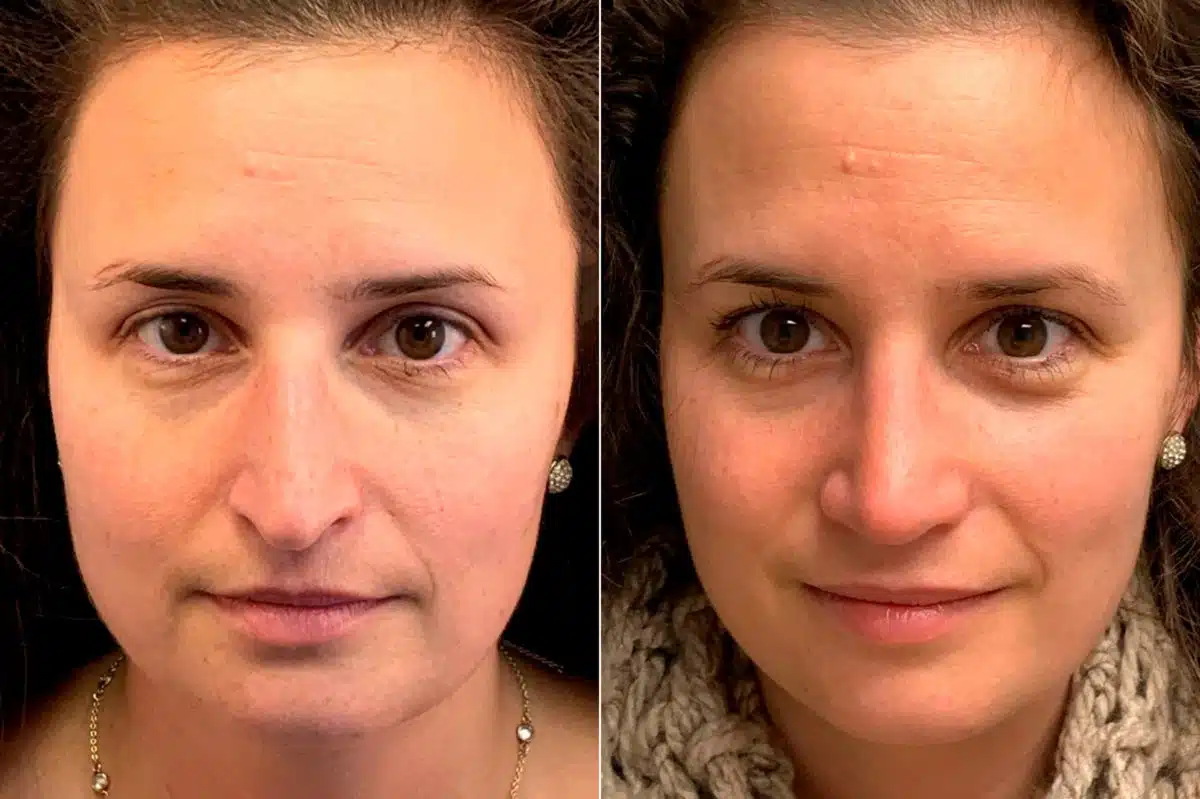
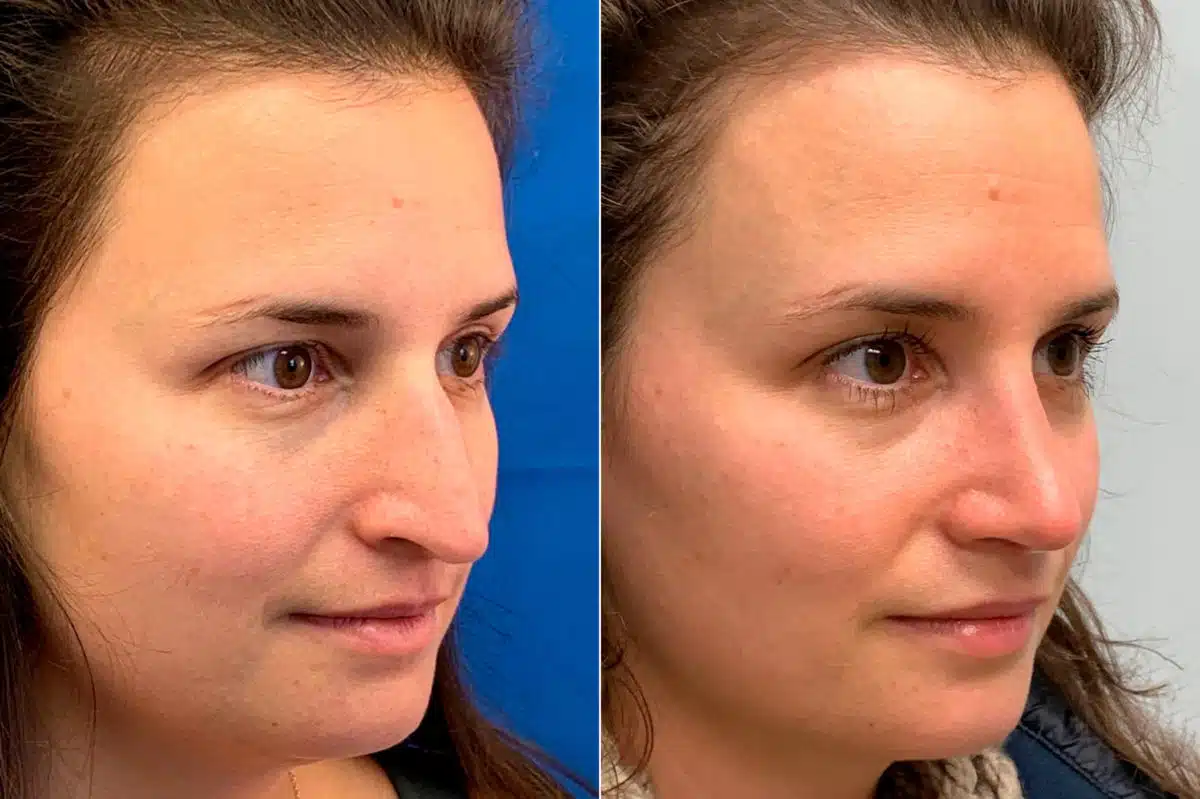
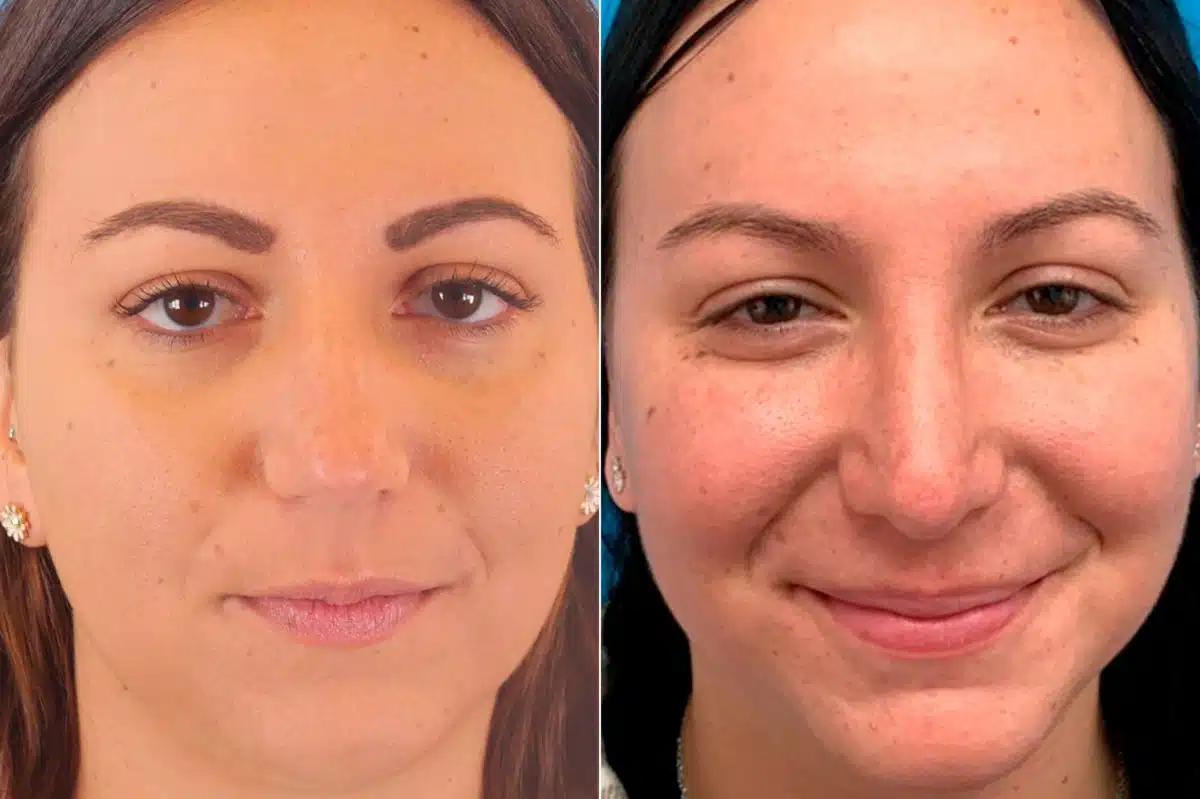
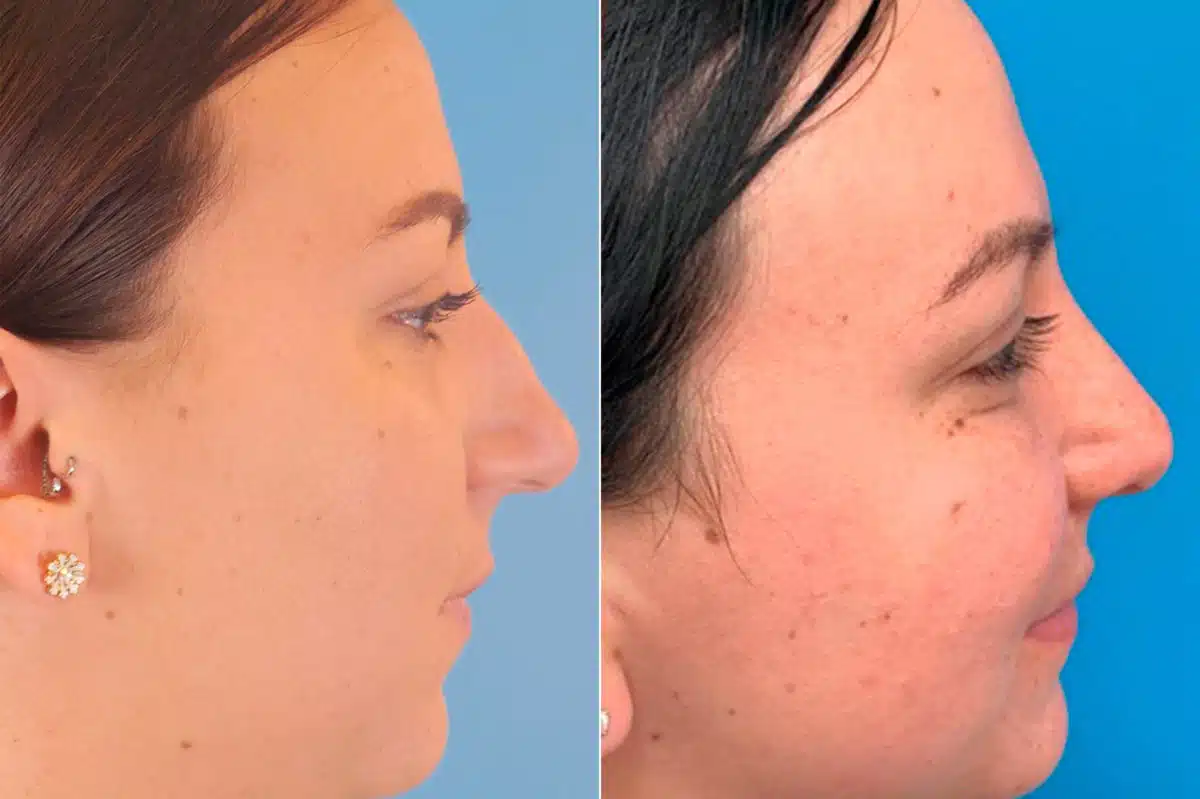
*All patients are unique and individual results may vary.
Benefits of Revision Rhinoplasty
One of the most important benefits of revision nose surgery is increased self-esteem for patients. Botched nose jobs can cause patients to feel self-conscious and embarrassed. In some cases, the surgical outcome of a poor previous surgery may appear even less attractive than the original nose.
During revision nose surgery, the doctor can change the size and shape of the nose and refine the look of the nasal tip. Even minor improvements will help to create harmony among the facial features and enhance the patient’s overall facial aesthetics. Many patients feel a sense of relief and confidence following a successful revision nose surgery.
In addition to looking better, patients may also be able to breathe more easily through their noses after revision rhinoplasty. A revision specialist like Dr. Becker can clear any obstructions from the nasal passages and create more structural soundness. If necessary, he can reshape the inner nose, effectively alleviating sinus pressure and infection.
Ideal Candidates for Secondary Rhinoplasty Surgery
Because of Dr. Becker’s experience, skills, knowledge, access to advanced technology, and artistic eye for rhinoplasty, New Jersey patients who seek out secondary nose surgery at the Becker Rhinoplasty Center typically qualify for the surgical procedure, even if they have complex concerns. Secondary nose reshaping is recommended for patients who dislike the look of their nose after an initial rhinoplasty or find that their nasal breathing has not improved after healing. A bad rhinoplasty procedure can affect everything from breathing to emotional well-being.
Because the healing time for rhinoplasty is lengthy, it is recommended that most candidates for revision rhinoplasty wait a full year from their initial surgical procedure to schedule a revision surgery. The doctor can ensure full healing of the nasal structure and verify that the poor results are not due to prolonged swelling. Any patient approved for plastic surgery should be healthy enough to undergo the surgical procedure and should expect a realistic outcome. The patient should also be able to communicate the changes they would like the doctor to strive for.
A Revision Nose Surgery Consultation in New Jersey or Philly
With two convenient locations along the East Coast, New Jersey rhinoplasty patients can choose to visit Dr. Becker’s New Jersey or Philadelphia offices for a revision nose surgery consultation. The appointment to assess the original procedure results is crucial to planning a revision procedure.
Evaluation and Testing
Dr. Becker may request that his NJ and Philadelphia patients undergo imaging or additional testing to determine what failed during the original rhinoplasty. The plastic surgeon will also assess whether there may be special considerations, like an additional surgery to harvest ear, rib, or other cartilage for grafting purposes. Nasal implants can also be affixed within the nose to rebuild certain areas in some cases. The consult appointment allows Dr. Becker to customize the procedure based on the patient’s unique needs.
Imaging and Treatment Preview
During the consultation, Dr. Becker may use imaging to preview approximate results for patients and explain how they may be achieved. In some cases, the doctor may suggest alternative treatments, such as semi-permanent nasal fillers or other correction methods. In order to achieve facial balance, the doctor may also recommend procedures for the jaw and chin.
Medical History and Examination
During the appointment, patients will go over their full medical and surgical history with Dr. Becker, and he will examine the nose. He may create a final plan at this time or request more medical information before building out a treatment blueprint. Dr. Becker will also be able to explain his approach to surgery, including the type of anesthesia that will be used and whether he will opt for an open rhinoplasty or a closed approach for incision placement.
Informative Consultation
This is the perfect opportunity for patients to ask questions and get all the information they need to make a decision about moving forward with revision rhinoplasty in New Jersey.
Patient-centered approach to achieving both aesthetic goals and enhanced health
Our clinic, dedicated exclusively to rhinoplasty, combines advanced surgical techniques with meticulous artistry to sculpt your ideal nose.
Expert Tips for Prepping for a Revision Rhinoplasty Surgery
During the consultation, Dr. Becker may use imaging to preview approximate results for patients and explain how they may be achieved. In some cases, the doctor may suggest alternative treatments, such as semi-permanent nasal fillers or other correction methods.
In order to achieve facial balance, the doctor may also recommend procedures for the jaw and chin.
While Dr. Becker serves many local patients in the New Jersey area, some patients travel internationally to undergo rhinoplasty. New Jersey has many excellent alternatives for accommodations and patients should plan to stay for at least a week or two in order to heal and attend follow-up appointments.
Those traveling from out of town should solidify their travel plans and hotel or other arrangements at least a week prior to the procedure. Staff can assist by suggesting convenient and comfortable lodging nearby.
Prepare the Recovery Environment
- Ensure a clean and comfortable space.
- Have clean laundry and bedding.
- Use appropriate pillows for elevated headrest.
- Prepare quiet entertainment options.
- Keep nutritious food and beverages readily available.
Keep Essential Items Within Reach
- Maintain head elevation.
- Avoid bending during the initial postoperative days.
- Ensure easy access to necessary items.
- Freeze approved cold packs for swelling.
- Fill prescription medications and use a pill divider to prevent over-medication.
Pre-operative Shower
- Follow Dr. Becker's recommendation for antimicrobial soap.
- An extra cleansing step to prevent infection.
Revision Rhinoplasty Before & After Photos
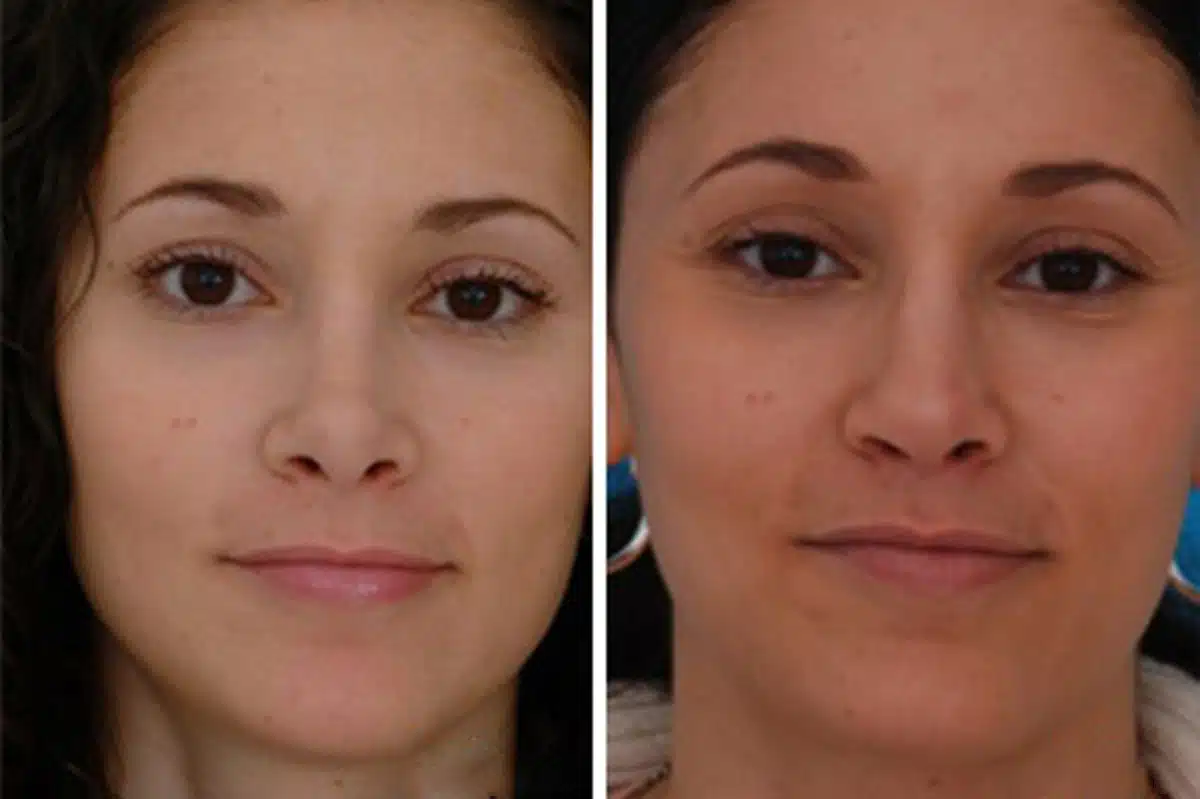

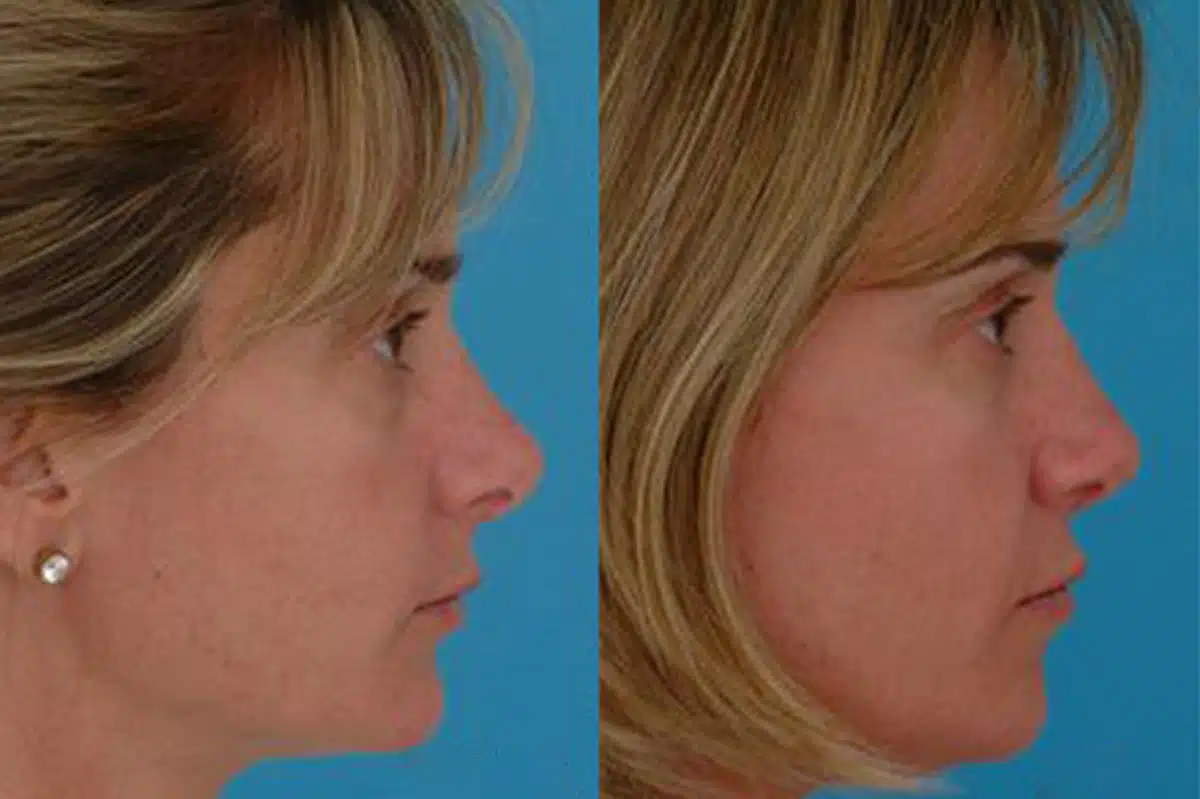
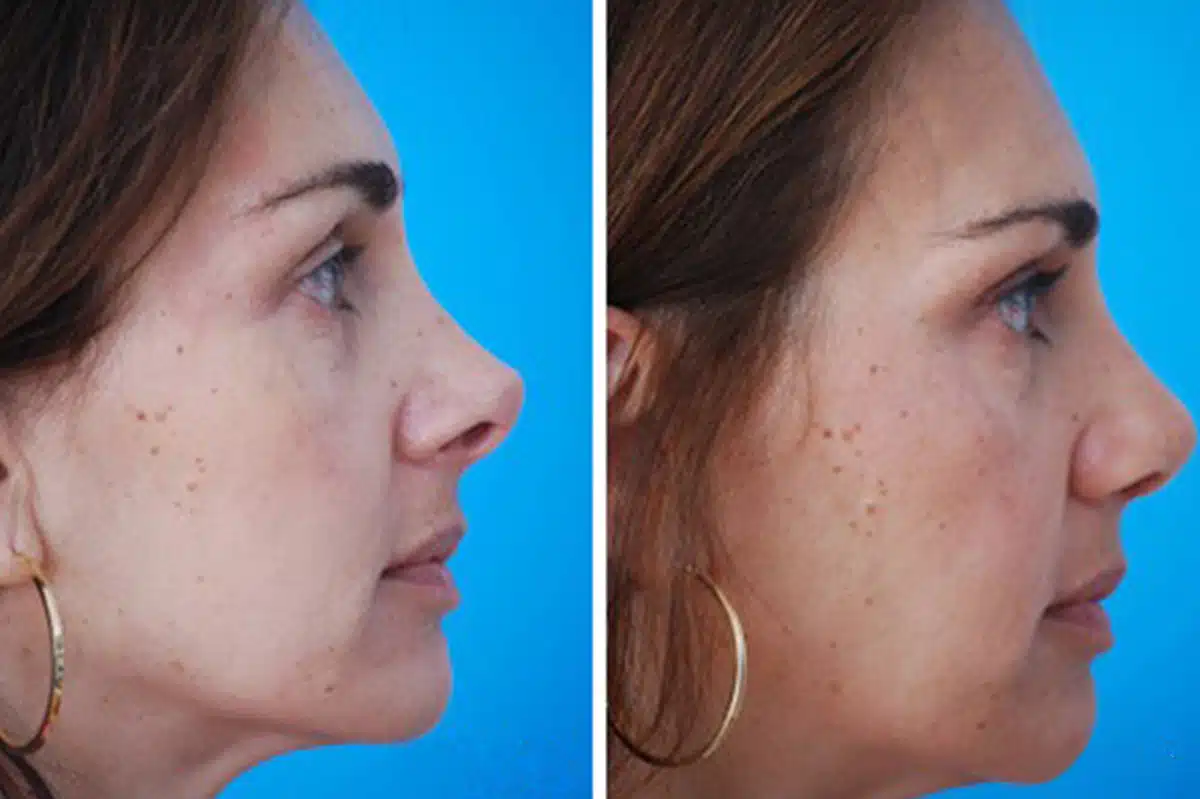
*All patients are unique and individual results may vary.
The Day of Revision Rhinoplasty Surgery
Corrective rhinoplasty in NJ is performed much like the initial nose surgery. If the patient’s health permits it, the surgical procedure is typically performed under general anesthesia. Before administering the general anesthesia, the doctor will meet with the patient and discuss his plans for the cosmetic surgery one final time. He may create markings on or around the nose with a surgical pen to help guide him during the surgical procedure. The patient also has the opportunity to ask any final questions about the surgical procedure.
Once the patient is comfortably asleep, Dr. Becker will begin the surgery, reshaping the nose according to the patient’s desired look. If he performs the revision rhinoplasty as an open procedure, Dr. Becker will make a small incision in between the nostrils to expose the anatomy of the nose. During a closed rhinoplasty, the skin of the nose will remain intact, and the bones and cartilage will be altered through incisions inside the nostrils. If Dr. Becker harvests cartilage grafts from the ribs, this is generally performed prior to alterations of the nose as the nasal tissue must be prepared for implantation. Internal or external sutures may be needed once the necessary changes have been made. The doctor might use nasal packing in the nostrils, cauterization, or other surgical techniques to control bleeding. Sutures will be needed to close any cartilage or bone harvest sites.
Real Patient Review
"I was 18 when I had my first Rhinoplasty. As I healed, the results got worse. Too much was taken-out/resected. It was upturned, and "pinched". As a young man, it just didn't fit my face. I then met Dr. Becker in 2000 (10 years after my first procedure). I spent months researching and working with Dr. Becker to make sure we got it right this time. We did. An amazingly skilled doctor who gave me the confidence (based on his skill and confidence) to go forward with the procedure. I really do look great today. It's very natural looking, and what I was originally going for. Sixteen years later and has healed very well. Thank you Dr. Becker!"




Revision Rhinoplasty Surgery Recovery
The nose remains especially malleable directly after a revision procedure. Patients must take care not to touch their noses, even if they itch. Patients may feel sleepy as the effects of the general anesthesia wear off. They should be prepared to schedule small meals and times to take their pain medication if needed.
During the first days after surgery, patients should try to keep their heads elevated at least to a 45-degree angle and avoid blowing the nose for a week or two. They should avoid any strenuous activity for the next several weeks to help prevent complications. Individuals who wear glasses may be asked to use sports tape to keep them from resting on the bridge of the nose.
To reduce swelling after plastic surgery, patients can use a cold pack and take their medications as instructed. Some things patients should avoid are bending over, smoking, and consuming alcohol. Most patients are cleared to return to work within a week after surgery. Any residual swelling and bruising can be camouflaged by cosmetics. Swelling will subside gradually over a period of months.
Potential Risks and Side Effects of Revision Rhinoplasty
In general, revision rhinoplasty surgery carries the risks of:
Anesthesia and Infection Risks
Adverse reactions to general anesthesia and infection. These risks are minimized by patients divulging their full medical histories, including any allergies to medications, and by keeping the area clean prior to and following the revision rhinoplasty procedure.
Unforeseen Events and Side Effects
Unforeseen events like trauma to the nose can affect the final look of the nose. Side effects can include issues breathing through the nose, asymmetry, and swelling, which may only be temporary but can be permanent. In some cases, a secondary surgery can correct these issues.
Advanced Complications and Precautions
Advanced complications may lead to the loss of cartilage and bone. Dr. Becker has an extremely high success rate, and because his focus is nose surgery, he takes extensive measures during the revision rhinoplasty preparation. Patients are advised to follow all at-home instructions to minimize complications.
Why Choose Dr. Daniel Becker for a Secondary Nose Surgery?
- Board Certified by the American Board of Otolaryngology (ENT).
- Board Certified by the American Board of Facial Plastic and Reconstructive Surgery (ABFPRS).
- Fellow of the American College of Surgeons (FACS).
- Top-Rated by US News and World Report, Philadelphia Magazine, South Jersey Magazine, Castle-Connelly, and others.
Dr. Daniel Becker is a true specialist in the art of revision rhinoplasty and is internationally known for his expertise. He serves as a Clinical Professor at the University of Pennsylvania and has continued research in nose surgery on an ongoing basis. He presents his findings all over the world to help his peers improve their techniques and outcomes. Educating others had been an integral part of his professional satisfaction. He has also authored journal articles and textbooks.
With a background as an otolaryngologist (ear, nose, throat doctor), the doctor has advanced experience with the intricacies of the nose. He is also the most qualified doctor to perform functional rhinoplasty, where septoplasty is combined with cosmetic components.
Frequently Asked Questions About Secondary Rhinoplasty
How much does a secondary nose job cost in NJ?
The cost for rhinoplasty, secondary rhinoplasty, septoplasty, and other procedures of the nose varies by case complexity and different fees, including anesthesia and facility fees. Most patients can expect to pay a total of $7,000–$10,000.
It varies by plan, insurer, and circumstances, but some insurance companies will cover the portion of a rhinoplasty that is performed for medical purposes. Septoplasty describes the part of a nose surgery that is performed to benefit a patient’s breathing. The procedure helps to evenly separate the nasal passages, alleviating nasal breathing issues, and sinus infections, fixing all types of issues regarding the nasal septum, and in some patients, snoring.
Patients whose bad nose jobs result from a purely cosmetic procedure will typically have to pay for revision surgery out of pocket. After a patient has attended the initial consultation, the doctor can discuss cost estimates with office staff to provide the patient with a quote. Patients may qualify for different payment plans.
What cost more, a primary rhinoplasty procedure or a revision rhinoplasty?
Compared to the initial surgery, revision rhinoplasty is generally felt to be a more complex surgery and requires specialized surgical skill sets and special experience, therefore the costs of fixing a previous nose job may be greater.
What is a “ski slope nose?”
Trends come and go, even in rhinoplasty. Years ago, a style known as the “ski slope” nose was popular. This type of nose has a slightly upturned tip and was created by removing tissue on the nasal bridge to emphasize the tip. This produced a cookie-cutter look and made it very obvious that a nose job had been performed. Today, patients typically want a unique, custom, and natural-looking nose, so the ski slope nose has fallen out of fashion. Revision surgery can be performed for patients who are no longer happy with the ski jump look and would prefer a more natural look. This may involve adding or removing soft tissue, depending on the patient.
New Jersey rhinoplasty expert Dr. Becker is at the forefront of innovative rhinoplasty techniques. He is involved in research, and implementation, and teaches up-and-coming as well as established board-certified plastic surgeons. Some of his approaches include building up tissue loss with patient-harvested cartilage and bone, advanced instrumentation, and using proven methods in surgery. Each surgery is different. Dr. Becker can provide his patients with more specific plans during their doctor-patient consultation as one of his top priorities.
What types of materials are added to the nose during revision rhinoplasty surgeries?
During a New Jersey revision rhinoplasty with Dr. Becker, common additions to the nose include the patient’s own cartilage and/or AlloDerm. Cartilage helps to rebuild areas of the nose to the desired height and shape, while AlloDerm sheets smooth out imperfections that are visible below thin skin.
Is revision rhinoplasty painful?
Secondary rhinoplasty is a similar experience to primary rhinoplasty, though patients may have additional sites of soreness with harvested tissues. New Jersey revision rhinoplasty patients’ comfort is of the utmost importance to Dr. Becker and his surgical staff. Revision Rhinoplasty Patients will be prescribed pain medications and provided with instructions on how to minimize swelling and discomfort. Patients are cautioned to take it easy for at least a week postoperatively.
How can I choose a plastic surgeon I can trust for my revision nose job procedure?
Understandably, many people who end up with bad previous rhinoplasty results are very nervous about choosing a surgeon to perform their secondary procedure. It’s important to do extensive research into the best plastic surgeon for nose jobs in your area. You may even want to travel in order to see a specialist like Dr. Becker, who is known for his expertise in these complex procedures. Dr. Becker is a top facial plastic surgeon in NJ, and revision rhinoplasty patients often feel that it’s worth the time and expense involved with traveling to our offices to get the peace of mind that his expertise in rhinoplasty New Jersey offers. When it comes to revision rhinoplasty, NJ top surgeons like Dr. Becker take great care in preserving or rebuilding nasal structures and creating natural-looking and beautiful results.
I’m looking to have secondary rhinoplasty. What information would you need from the original surgeon?
It is always nice to have pre-operative pictures, an operative report, or even a brief letter from the surgeon. None of these things are critical, but from time to time this information from the prior surgeons can be helpful.
What are some common issues people want addressed with revision rhinoplasty?
The most common problem is over-resection of the nasal tip (the tip looks “over-done.”). Another common problem is too much or too little taken off the bridge. A third common problem is the nose is twisted or asymmetric.
Is general or local anesthesia used for rhinoplasty surgery?
Dr. Becker performs rhinoplasty with the patient under general or sedation anesthesia. These days, he is finding that more patients seem to prefer general anesthesia, but either way is fine with Dr. Becker. Under sedation, your nose and surrounding areas will be numb and you will drift in and out of sleep. With general anesthesia, you will be asleep for the entire procedure. The risks of anesthesia will be discussed with you by the anesthesiologist.
Why is the recovery time for revision rhinoplasty a lot longer the second time than for the first procedure?
In an initial rhinoplasty procedure, the skin is lifted to make cosmetic changes beneath the skin. The healing process creates scar tissue between the skin and the bone and cartilage beneath. In revision rhinoplasty, the skin is again lifted, but this time, surgery proceeds through this layer of scar tissue. Primarily because of this difference, the healing process for the “final result” is prolonged compared to an initial procedure.
Are there things that can’t be fixed with revision rhinoplasty?
Most problems can be improved. Unfortunately, some problems are beyond repair. Fortunately, this is not common.
What revision rhinoplasty office is near me?
If you live in New Jersey, Becker Rhinoplasty Center offers revision rhinoplasty. For a full list of services, please visit our Locations page.